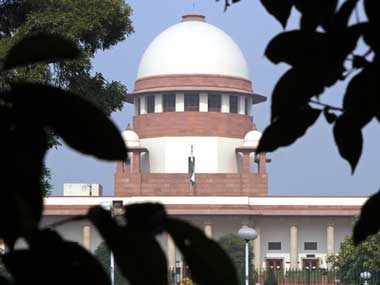New Delhi: The marathon hearings on the issue of framing guidelines for reporting court proceedings today concluded in the Supreme Court with some noted jurists terming the endeavour as “judicial overreach” which will open the “flood gates” with a whole range of “complications”. A five-judge constitution bench reserved its judgement after 17 days of hearing which started on 27 March. The bench was told that the apex court did not have inherent powers to lay the guidelines on the issue which falls in the domain of legislature. [caption id=“attachment_297691” align=“alignleft” width=“380” caption=“Reuters”]  [/caption] At best the judiciary can come out with “normative” and not “mandatory” or “exhaustive” guidelines as it would “clash” with the fundamental rights of the scribes. However, the bench headed by Chief Justice SH Kapadia, which was facing opposition from noted jurists, Fali Nariman and Soli Sorabjee, wanted to know: “can’t we come out with some principles (on regulating the media)”. “If we come to a conclusion that there are principles settled by earlier judgements, we can enumerate them in our judgement. You can call it either guidelines, regulations or principles. “If we don’t do that who or which institution will do,” the bench, also comprising justices DK Jain, SS Nijjar, Ranjana Prakash Desai and J S Khehar said. The bench got a negative reply from Nariman who said “no, you can’t do”. He also said when he had filed the application on the issue he was under the impression that the matter was limited to dispute between Sahara Group and SEBI. The noted jurist said when the ambit of the matter expanded he thought of withdrawing the application, which he had filed after a privileged note by him to SEBI was leaked to a TV channel. Nariman said he and Attorney General GE Vahanvati, who were appearing for two different sides, had discussed that “there is scope for remedial measures”. “We want normative guidelines. The Attorney General also said he is for normative guidelines,” Nariman said adding that “the moment you say this is a law then a whole range of complications will arise”. Later, the bench got support from senior advocate KK Venugopal, who endorsed its view that “guidelines have to be framed to make them (journalists) know where they stand”. “Court has the power to control reporting of its own proceedings,” he said. However, Nariman, who was against any restriction on media, said persuasion and discussion (with editors) was the better option as guidelines would open the flood gates. “You are opening the flood gates. This is my apprehension on the guidelines,” he said while cautioning the bench that there would large number of pleas in the courts for securing injunction. He was referring to the expanding media and impact of fast moving technology where information was being disseminated through twitter and other social networking sites. However, the bench said it was concerned with the “mainstream media and not with others like blogs, etc”. PTI
A five-judge constitution bench reserved its judgement after 17 days of hearing which started on 27 March.
Advertisement
End of Article
Written by FP Archives
see more


)
)
)
)
)
)
)
)
)



